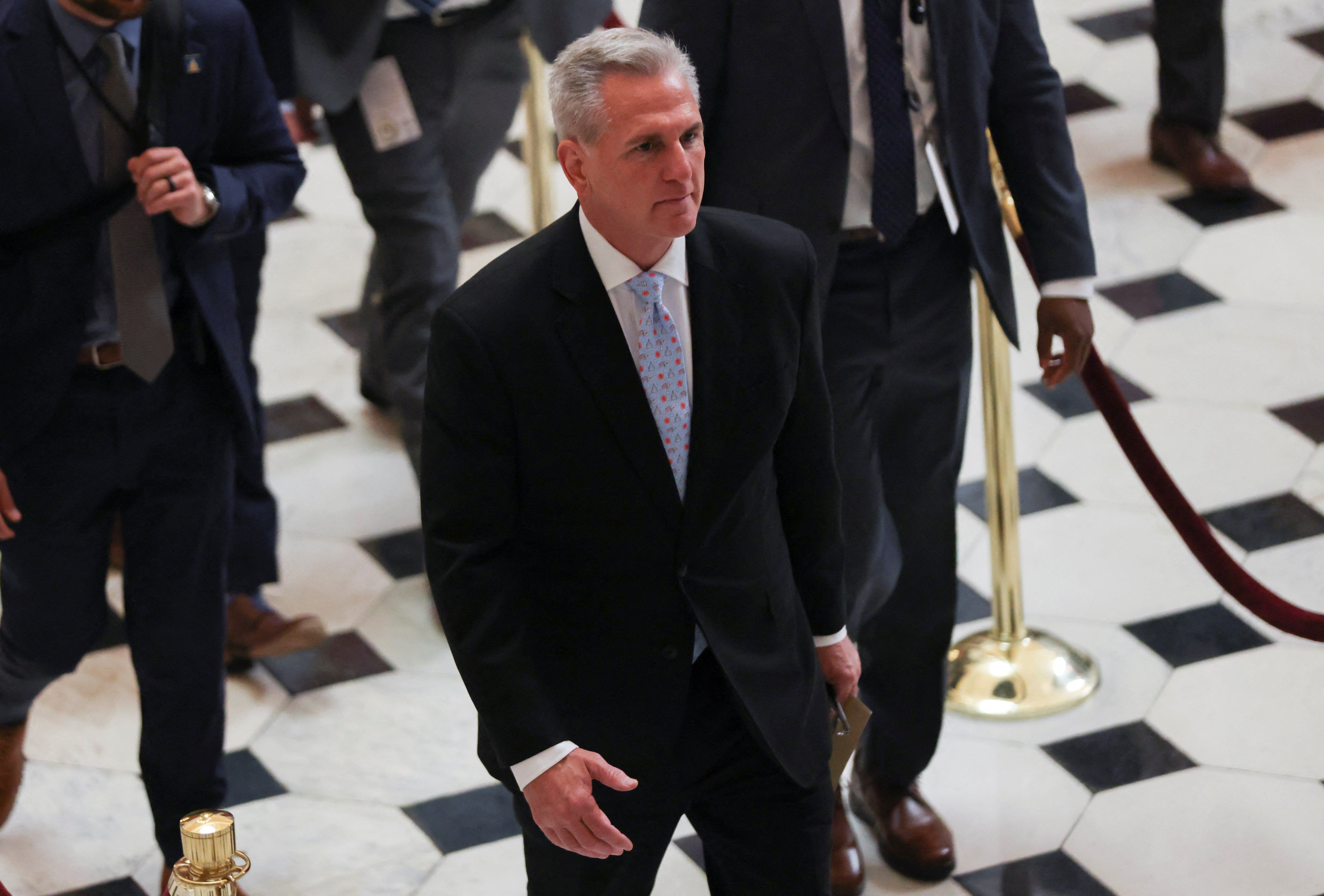May 08, 2023
The US treasury is set to run out of cash in early June, which means the country is rapidly approaching a fiscal breaking point. That’s why President Joe Biden is huddling with House Speaker Kevin McCarthy and other congressional leadership on Tuesday for urgent debt ceiling discussions.
The June deadline poses a Catch-22 for McCarthy, whose options are to hold the government hostage or compromise on Republican demands by striking a deal with the Democrats. The latter would lead to a backlash from his own party and likely cost him his job.
Why this matters: The debt ceiling is the limit on how much the government can borrow from the US treasury to pay its bills. The US functions at a massive deficit, so the government has to borrow money to pay for things like Social Security, veterans benefits, and Medicare.
The US officially hit its limit back in January and has been operating under “emergency measures'' ever since, enabling the US to fulfill its financial obligations. But the government’s ability to borrow through these measures could dry up as early as June 1. If a deal isn’t reached before then, the government stops functioning and could wind up defaulting on its debt – a historic first that would plunge global markets into crisis.
The players gathering at the White House on Tuesday know the stakes, but that doesn’t mean they’re ready to compromise. Historically, Republicans have been comfortable with weaponizing the debt ceiling to get concessions from Democrats. This time is no different.
“The best-case scenario is probably that they agree to have further discussions,” says Jon Lieber, managing director of Eurasia Group's US Practice. “But it's possible the meeting splits up with no progress made and no next steps, which should and will drastically increase market anxiety as we are only a few weeks away from a potential default.”
Both parties want to curb the weight of future US debt, but they share almost no common ground on the proposed tax and spend solutions. The Democrats want to increase taxes on the wealthy and large corporations, while Republicans narrowly passed a bill in April that would raise the debt limit in exchange for deep spending cuts and reversals of recent climate legislation.
The Republican bill isn’t likely to pass the Senate and would be vetoed by Biden even if it did. But getting House Republicans behind that bill was a big win for McCarthy because the GOP is so opposed to raising the debt limit. Pushing it through before Tuesday’s political showdown was a sign that Republicans are ready to stand united to bring Biden to the negotiating table. Senate Republican leader Mitch McConnell has reportedly had multiple calls with McCarthy to coordinate strategies. The Republican bill is their blueprint – the list of demands they want Biden to meet in exchange for their votes to raise the debt ceiling.
Democrats, for their part, hope they can get five Republicans to cross the aisle for a bipartisan deal. But that may be wishful thinking. McCarthy won the speakership by making tough concessions to the most conservative of House Republicans – the Freedom Caucus – including that any single member of the House could call a vote to fire him at any time. Now at the mercy of those conservatives, any bipartisan deal forged by McCarthy would likely spark a backlash that would see him stripped of the speakership.
Overall, Tuesday’s talks are unlikely to achieve much, and avoiding a US default and subsequent financial crisis will likely be down to who blinks first on the need for compromise.
“Neither side has a sustainable position right now,” says Lieber. “McCarthy knows that he's not going to get all of what the House passed two weeks ago, but it's not clear that Biden knows he's also going to have to compromise to make this happen. And that's a major challenge to getting to an agreement.”
From Your Site Articles
More For You
Xi Jinping has spent three years gutting his own military leadership. Five of the seven members of the Central Military Commission – China's supreme military authority – have been purged since 2023, all of whom were handpicked by Xi himself back in 2022.
Most Popular
Sponsored posts
Five forces that shaped 2025
What's Good Wednesdays
What’s Good Wednesdays™, January 28, 2026
Walmart sponsored posts
Walmart’s commitment to US-made products
- YouTube
In this episode of GZERO Europe, Carl Bildt examines how an eventful week in Davos further strained transatlantic relations and reignited tensions over Greenland.
- YouTube
In this episode of "ask ian," Ian Bremmer breaks down the growing rift between the US and Canada, calling it “permanent damage” to one of the world’s closest alliances.
An employee works on the beverage production line to meet the Spring Festival market demand at Leyuan Health Technology (Huzhou) Co., Ltd. on January 27, 2026 in Huzhou, Zhejiang Province of China.
Photo by Wang Shucheng/VCG
For China, hitting its annual growth target is as much a political victory as an economic one. It is proof that Beijing can weather slowing global demand, a slumping housing sector, and mounting pressure from Washington.
© 2025 GZERO Media. All Rights Reserved | A Eurasia Group media company.
